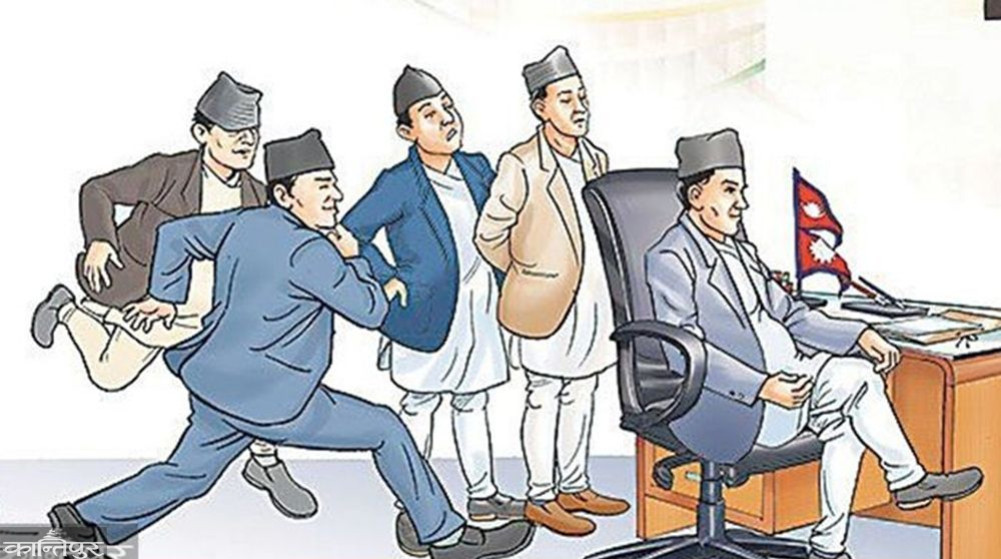Not only the law, but also the regulations issued by themselves, allowed Giribandhu to exchange land
We use Google Cloud Translation Services. Google requires we provide the following disclaimer relating to use of this service:
This service may contain translations powered by Google. Google disclaims all warranties related to the translations, expressed or implied, including any warranties of accuracy, reliability, and any implied warranties of merchantability, fitness for a particular purpose, and noninfringement.


The decision of the Supreme Court has revealed that the government of that time violated the rules made by itself while granting permission to exchange 344 bigha land of Giribandhu T-Estate. Based on the law passed by the Parliament in 2076, the Ministry of Land Reforms issued regulations in 2077 to allow for the exchange and sale of land that has been exempted from restrictions. However, it has been confirmed that the government has given permission to exchange the land of tea plantation by mixing the law made by the parliament and the regulations made by itself.



The Land Act 2021 prohibited the 'sale, distribution or transfer of rights in any manner or speculative lease' of land exempted for certain purposes. Section 12 (c) of the Act in force until 2076 said, 'According to the order, the industry, establishment, company, project, educational institution or any other organization related to the purchase of the land shall not be allowed to sell or distribute the rights to anyone or in any way transfer or lease the land. Parliament passed the bill brought by the government to amend this system in January 2076.
In the eighth amendment of 2076, two provisions were added by adding 'but'. 1 said, 'If such an industry, establishment, company or organization is dissolved or liquidated for any reason, it shall not be considered as a hindrance to the sale and distribution of such industry, establishment, company or organization subject to the approval of this Act.' -break was also added in 2, 'If the application showing proper and sufficient reason to relocate or lease the agricultural farm, industry, establishment, company or organization established on the land within the limits specified by the notified order of the Government of Nepal, such agricultural farm, industry, establishment, company Or the land being occupied by the organization will be subject to this Act and the Government of Nepal may give approval for lease or transfer to another place. By adding 16 (a) in the Land Regulations 2021, provision was made that 'can apply for land lease or transfer'. For which there are 9 conditions -
(a) Reasonable and sufficient reason for land lease or transfer and documents confirming the same,
(b) At the time of lease or transfer, such agricultural farm, industry, establishment, company or organization Commitment to lease or transfer so that it does not conflict with the purpose,
(c) Use the land subject to the existing laws related to land use and plan to purchase the proposed land in such a way that the production of the former does not decrease after the lease or transfer and in the confession,
(d) Less than the land used in the former In the confession with the assurance that the land will not be purchased,
(e) In the confession that is not less than the number of jobs provided at the time of commencement of this rule,
(f) In the case of speculative lease or transfer, the environmental impact of the place to be leased or transferred is approved according to the prevailing laws. Study report,
(g) Letter of recommendation of such agricultural farm, industry, establishment, company or institution.' The government opened the way for decision-making by introducing a rule that land above the limit can be exchanged on the basis of commitments and confessions. However, the constitutional bench has confirmed that the government has allowed the tea plantation land to be leased by violating the same cultivation regulations.
Advocate Omprakash Aryal, demanding the annulment of the amended Acts and Regulations and the decision of the government in July 2078, the judgment came last January. The full text of which has been released this week. The Constitutional Bench of the Supreme Court headed by Chief Justice Vishwambhar Prasad Shrestha and Justices Ishwar Prasad Khatiwada, Prakashman Singh Raut, Sapna Pradhan Malla and Sushmalata Mathema did not question the legality of the laws made by the Parliament and the regulations made by the government. Instead, the decision made by the Oli government on 13 Baisakh 2078 to exchange 344 bighas of tea plantation land, which violated the law and especially the regulations, has been cancelled.
On the one hand, it is stipulated in the regulation that the land to be exchanged should not decrease the number of jobs provided by the industry, the area should not be less than the previous one, the production of the previous one should not decrease and environmental assessment should be done. However, the constitutional bench has taken seriously the fact that the government has decided to allow the transfer of tea plantation land without being sure where the land to be exchanged belongs to and how much it is. As the land itself is not fixed, the reference to environmental assessment is automatically deleted. However, based on the proposal submitted by the Ministry of Land Reforms, the government gave permission to exchange the land. The
verdict states, "Where, what place, how much land is to be leased or how the land is to be transferred, no document attached to Missile, including the decision of the Council of Ministers dated May 13, 2078, was revealed. In addition to this, the proper and sufficient reason for land lease or transfer has not been revealed and there is no basis to confirm the same. It is mentioned in the judgment that the Council of Ministers took the decision by keeping the conditions of borrowing and intangible nature.
Commenting on the government's decision to allow the sale of demarcation facility land for plotting, the Supreme Court reminded that the government and any official cannot be above the law. It seems that the writ petitioner claims that approval has been given for the lease for the purpose of plotting the land and selling it as a ghaderi.
When looking at the background of the disputed decision and the relevant circumstances, it is not seen that it can be assumed that the land is not intended to be used for real estate business. There is no freedom for any agency or official of Nepal government to make decisions against the law. No one is above the law, the law is paramount. The Supreme Court said that the government's decision would cause 'undesirable irregularities and create obstacles in good governance', saying, 'Giribandhu T-Estate Pvt. Disputed decision to give permission to sell land for lease is Section 12 c of Land Act 2021. and Rule 16 of the Land Rules 2021 a. Since the legal provisions are not favorable and immature in nature, the said decision and all actions taken/done in accordance with it, including the correspondence, are deemed to be null and void by the order of transmission in accordance with sub-sections 2 and 3 of Article 133 of the Constitution of Nepal.
 प्रकाशित : जेष्ठ ३, २०८१ ०५:५६
प्रकाशित : जेष्ठ ३, २०८१ ०५:५६

 २१.१२°C काठमाडौं
२१.१२°C काठमाडौं
















